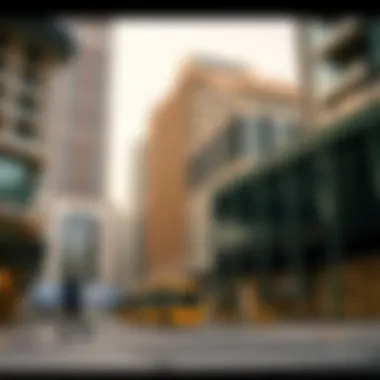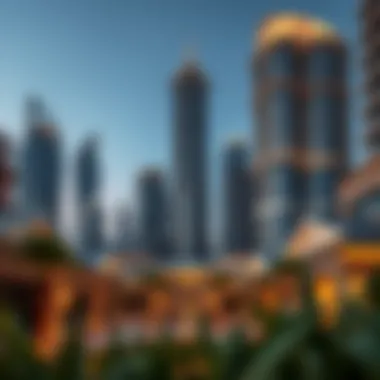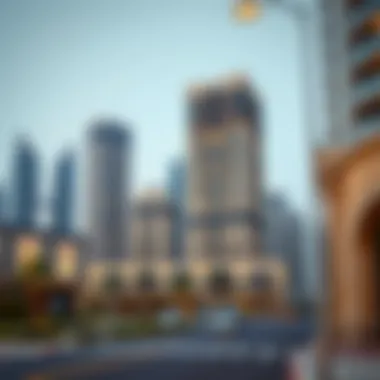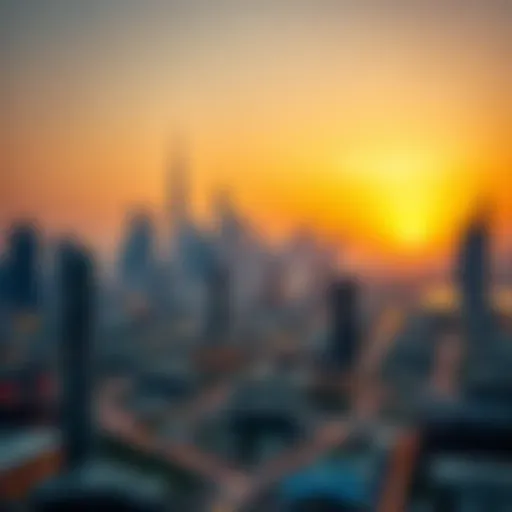Exploring Dubai's Metropolitan Real Estate Landscape


Intro
Dubai has rapidly become a centerpiece of global attention, especially in the realm of real estate. Its skyline, punctuated by iconic structures like the Burj Khalifa and innovative developments, attracts investors and buyers from every nook and corner of the world. The metropolitan real estate in Dubai presents a palette of options, from luxurious villas to chic apartments, catering to diverse preferences and investment strategies.
As the emirate flourishes, understanding the dynamics of the property market is crucial not just for potential homeowners but also for seasoned investors and real estate professionals alike. The landscape is ever-evolving, marked by sophisticated architectural innovations and varying buyer preferences. This makes Dubai's real estate sector not only a lucrative avenue for investment but also a fascinating environment to navigate.
This exploration delves deep into the currents shaping the market, the prevailing trends, and the opportunities that may lie ahead. It will pull no punches in laying out key insights that are foundational for making informed decisions in this lively market.
Now, let’s dive straight into the Property Market Analysis.
Understanding Dubai's Metropolitan Real Estate
The realm of Dubai's metropolitan real estate is a multifaceted domain, brimming with opportunities for both seasoned investors and first-time buyers. Understanding this landscape is crucial for various reasons. It isn't merely about purchasing a property; it involves grasping market dynamics, identifying ideal neighborhoods, and appreciating architectural innovations. Each of these elements contributes significantly to the decision-making process.
Those who understand the nuances of Dubai's real estate market can navigate it with greater ease and confidence. This comprehension goes beyond mere property value; it encompasses trends, investments, and regulatory aspects that shape the market landscape. With the city's steady growth and international lure, recognizing these dynamics offers an edge over competitors.
Overview of the Real Estate Landscape
Dubai’s real estate scene is a vibrant tapestry woven from diverse threads of culture, technology, and ambition. The emirate stands out not only for its breathtaking skyline but also for its consistently evolving property offerings. The landscape, characterized by towering skyscrapers alongside sprawling villas, appeals to a vast spectrum of buyers, from affluent individuals seeking luxury condos to families looking for spacious homes.
Recent years have seen Dubai become a hotspot for foreign investment. Regulations have geared towards encouraging international buyers, creating a competitive marketplace. In contrast, the residential sector has witnessed a blend of high-end and affordable housing options, catering to an expanding population and a diverse workforce. The city has morphed into an attractive destination, not just for expats, but for global investors seeking solid returns.
- The demand has often outstripped supply in core areas, driving prices higher.
- Emerging neighborhoods such as Dubai Marina and Downtown Dubai showcase luxurious living, while suburban areas offer family-friendly environments at more accessible prices.
"Dubai's real estate market reflects the aspirations of a city that never ceases to evolve, making it an excellent platform for real estate investment."
As technology continues to influence the market, potential buyers can now access detailed market analyses online or engage in virtual property tours, enhancing their buying experience. Coupled with favorable government policies, the emphasis on sustainability within developments has further attracted eco-conscious investors.
Key Characteristics of Urban Properties
The urban properties in Dubai showcase unique characteristics that set them apart from other global markets. First and foremost, location is everything. Proximity to key infrastructure, including schools, healthcare facilities, and shopping districts, heavily influences property values. Buyers are more inclined to invest in areas that offer convenient access to amenities, thus fostering a thriving community.
In Dubai, one may observe distinct categories of urban properties:
- Luxury Apartments: Typically located in high-demand areas, these properties are characterized by high-end finishes, modern amenities, and breathtaking views. They cater predominantly to affluent buyers and investors.
- Townhouses: Offering a balance between privacy and communal living, townhouses appeal to families looking for spacious yet manageable homes. They often provide easy access to parks and schools, making them attractive for long-term residents.
- Villas: A staple in Dubai's property landscape, villas provide luxury living with more outdoor space. They often feature private pools, gardens, and a higher degree of exclusivity, making them a preferred choice for families seeking a lavish lifestyle.
Understanding these characteristics can greatly influence investment strategies, whether a buyer is looking for rental yield, capital appreciation, or a residence that suits their lifestyle needs. A nuanced approach to these properties enables potential buyers to make informed choices in a dynamic market.
Market Trends Shaping Dubai's Real Estate
Understanding the current trends in Dubai's real estate market is indispensable for anyone looking to invest or buy property in the region. With the city's ever-evolving landscape, staying informed about market movements can significantly impact decision-making. Investors, buyers, and industry professionals must consider factors like property prices, global economics, and burgeoning neighborhoods, all of which shape the overall market dynamics.
Current Property Prices and Trends
In recent months, the property market in Dubai has exhibited a range of fluctuations, with prices varying across different districts. Notably, areas like Dubai Marina and Downtown Dubai remain some of the most sought-after locations, driving up property values. For instance, in the third quarter of 2023, average property prices have seen a noticeable uptick, increasing by about 5% in prime areas compared to the previous year.
Factors fueling this growth include a strong influx of foreign investment and a resurgence in population as expatriates return. Despite global economic uncertainties, Dubai has managed to sustain a relatively stable market, attracting investors who are eager for high returns on residential and commercial properties.
Additionally, the demand for luxury apartments and villas has surged, benefiting from high-profile events like Expo 2020. These events not only boost tourism but also create a ripple effect on real estate. Buyers are increasingly gravitating toward properties that offer premium amenities alongside stunning views, making the allure of metropolitan living more pronounced.
Impact of Global Economic Factors
Dubai's economy is indelibly linked to broader global economic conditions. For instance, changes in oil prices significantly sway investor confidence in the region. As a major trading hub, any ambiguity in the global markets could affect property demand. Despite this, recent trends indicate resilience; for periods where oil prices were low, Dubai's real estate market diversified to commercial and service sectors.
Moreover, the fluctuations in currency exchange rates could also affect foreign buyers. The purchasing power of international investors tends to fluctuate with changes in their native currencies compared to the UAE Dirham. This creates a dynamic environment where potential buyers have to constantly adjust their strategies. Thus, industry insiders recommend thorough market analysis and expert consultations, ensuring that decisions are backed by robust data.
Emerging Neighborhoods to Watch
While traditional hotspots like Dubai Marina continue to thrive, some areas are establishing themselves as up-and-coming neighborhoods worth considering. Districts such as Dubai Creek Harbour and Jumeirah Lake Towers (JLT) show promise due to ongoing infrastructure projects and plans for urban development.
In Dubai Creek Harbour, the government's vision includes a blend of residential and commercial spaces that are designed to foster a community feel.
"Dubai Creek Harbour aims to redefine urban living by integrating nature into the city, encouraging a more sustainable lifestyle."
On the other hand, JLT is noted for its affordability relative to its central location, making it popular among young professionals. The community vibe and modern amenities are pulling in renters and buyers alike, establishing it as a strong contender for investment considerations.
Lastly, areas like Mohammed Bin Rashid City are witnessing rapid growth with a focus on luxury and lifestyle-oriented living, making them ideal for long-term investments.
In summary, as you navigate the multifaceted landscape of Dubai's real estate, understanding these market trends becomes essential to making enlightened decisions. Keeping a close eye on property prices, evaluating global economic impacts, and identifying emerging neighborhoods can facilitate a strategic approach to investing in one of the most dynamic real estate markets in the world.


Residential Real Estate in Metropolitan Dubai
The world of residential real estate is a cornerstone of Dubai's thriving property market. With its unique architectural styles and diverse neighborhoods, it caters to a wide range of buyers and lifestyle preferences. Understanding the landscape of residential real estate in metropolitan Dubai isn't just about choosing a place to live; it’s an investment decision, influenced by factors like location, design, and market conditions.
This article will delve into the various types of residential properties available, each with its own set of characteristics and market appeal. Also, examining design trends helps potential buyers grasp what to expect from their living environments.
Types of Residential Properties Available
Luxury Apartments
Luxury apartments in Dubai are the crème de la crème of the property market, and for good reason. These high-end residences often feature stunning views of the skyline or the Arabian Gulf. They come equipped with top-notch amenities such as swimming pools, fitness centers, and concierge services — all factors that enhance the quality of living.
The key characteristic of luxury apartments is their location, often situated in prime areas like Dubai Marina or the Burj Khalifa district. This makes them not only attractive for residents but also a popular choice for investors looking for premium rental yields. One unique feature is the design emphasis on open spaces and natural light, creating a warm and inviting atmosphere. However, they can come with a hefty price tag, which might not align with everyone's budget.
Townhouses
Townhouses provide an appealing blend of privacy and community living. They usually come in clusters, sharing common walls but offering an exterior that feels very much like a traditional home. The key characteristic here is their multiple levels, allowing for more spacious interiors compared to apartments. Many buyers consider townhouses appealing because they are often part of family-friendly communities, which can include parks, amenities, and child play areas, making them a popular choice for families.
A notable unique feature of townhouses is that they often include outdoor spaces, like gardens or terraces, providing a breath of fresh air. This extra space can be a double-edged sword, though; while it can enhance lifestyle, it may also require more maintenance, which some buyers prefer to avoid.
Villas
Villas in Dubai represent the pinnacle of luxury living, offering privacy and exclusivity that many buyers desire. These standalone properties often boast extensive living spaces, private pools, and beautifully landscaped gardens. The key characteristic of villas is their spaciousness, allowing for customization and personal touches in design.
Villas are often located in upscale neighborhoods that are highly sought after, such as Emirates Hills or Jumeirah. A significant unique feature is the potential for personal pools and outdoor facilities, catering to a luxury lifestyle. However, villas usually come with a higher maintenance responsibility, which could deter those looking for simpler living arrangements.
Trends in Apartment Design and Amenities
The apartment sector in Dubai is undergoing remarkable transformation, with a strong focus on modern design and innovative amenities. Many new developments emphasize sustainability, incorporating energy-efficient systems and eco-friendly materials into their designs.
Apartments are increasingly featuring smart home technology, allowing residents to control everything from lighting to security with just a few taps on their phones.
One prominent trend is the integration of communal spaces within apartment buildings. Rooftop gardens, shared lounges, and co-working spaces are quickly becoming essential for modern living, addressing the need for social engagement and work-life balance. As the demand for these aspects grows, developers are keen to provide environments that foster community while maintaining individual privacy.
In summary, residential real estate in metropolitan Dubai is rich with variety, catering to a broad spectrum of preferences and investments. Understanding the differences among luxury apartments, townhouses, and villas helps prospective buyers to make informed decisions and navigate their options effectively as they step into the Dubai market.
Commercial Real Estate Opportunities
In the grand tapestry of Dubai's metropolitan landscape, commercial real estate holds a particularly significant thread. It’s not just about office buildings, retail spaces, or warehouses; it’s the underpinning of the economic engine that drives business, innovation, and international trade. Understanding the nuances can spell the difference between a mediocre investment and a profitable venture. Whether you're a seasoned investor or simply curious about the opportunities available, grasping the dynamics of this market is crucial.
Investing in commercial real estate opens a plethora of avenues. Typically more lucrative than residential properties, these ventures promise higher returns, especially in a thriving market like Dubai's. Moreover, choices range from leasing retail outlets in bustling areas like Dubai Mall to acquiring spacious office suites in rapidly developing districts. This variety expands the options available for investors, allowing for tailored strategies based on individual risk tolerance and investment goals.
Growing Commercial Districts
The pulse of commercial real estate in Dubai lies in its growing districts. As the city metamorphoses into a global business hub, several areas are emerging as hotspots for investment:
- Business Bay: Often labeled as the central business district, it’s home to some of the city's tallest towers and corporate headquarters. The ongoing infrastructure improvements and an ever-growing workforce make it an attractive area for domestic and foreign investors.
- Dubai Silicon Oasis: This tech-focused zone caters to the digital economy, boasting a robust infrastructure for businesses involved in IT and technology. With governmental support for tech start-ups, this area is rapidly developing into a commercial goldmine.
- Jumeirah Lakes Towers (JLT): A mixture of commercial and residential development, JLT provides companies a unique environment to thrive. Its accessibility and panoramic views make it desirable for businesses and their clients alike.
By watching these districts, investors can position themselves to capitalize on the growing market demand.
Investment Potential in Commercial Spaces
Diving into the financial prospects of commercial spaces brings clarity to their appeal:
- Long-Term Leases: Commercial properties often feature longer lease durations compared to residential properties. This security means predictable cash flow, which can help recoup initial investments more rapidly.
- Higher Rental Yields: Rents for commercial spaces tend to be significantly higher than those in residential markets. A well-located office space in Dubai can yield returns ranging from 7% to 10% annually, making it an enticing prospect for investors.
- Capital Appreciation: In a city like Dubai, known for its ever-expanding horizon, capital appreciation is almost a given. Properties in emerging neighborhoods are expected to rise in value, providing a solid return upon resale.
- Diverse Use Cases: These spaces can cater to a plethora of industries, from retail to hospitality, enhancing the potential for long-term tenants and diversifying risk.
The commercial sector in Dubai is not merely about dollars and cents; it’s about being part of a city that’s on the rise, a city that welcomes innovation and international business.
Understanding the intricacies of commercial real estate in Dubai offers investors not just a pathway to financial growth, but also an opportunity to play a role in the city's unfolding narrative. As Dubai continues to evolve, the potential embedded in its commercial spaces and districts is bound to increase, making now an ideal time to stake your claim.
Investment Insights for Buyers
Navigating the overwhelming world of real estate investment in Dubai can feel like stepping into a bustling market. With its ever-evolving landscape and enticing opportunities, buyers need to arm themselves with crucial insights. Investment insights provide a solid foundation for making informed decisions. These insights encompass understanding market dynamics, assessing risks, and formulating strategies tailored to individual goals. Buyers keen on entering Dubai's metropolitan real estate scene must recognize the importance of being proactive and educated.
Understanding Investment Risks
Investors looking to dive into Dubai's vibrant real estate market should begin by grasping the various investment risks involved. The market, while promising, comes with its share of uncertainties. For instance, fluctuations in property values can be influenced by global economic tides, local policy changes, or even shifts in consumer preferences. Additionally, there's the risk of overestimating the potential returns on investment—high expectations can lead to disappointment.
It's wise for investors to approach potential purchases with a critical eye. Here are some risks to keep in mind:


- Market Volatility: Just like a rollercoaster ride, property values can ascend and descend rapidly.
- Regulatory Changes: The Dubai government can introduce new laws or taxes that could impact profitability.
- Property Maintenance: One must factor in ongoing costs for upkeep, which can cut into potential profits.
Understanding these risks allows buyers to prepare and mitigate potential pitfalls.
Evaluating Property Value
Once an investor navigates the risk landscape, grappling with property valuation becomes the next vital step. This process is much like piecing together a puzzle—several factors come into play. Market trends, location, amenities, and historical data all contribute to determining a property's worth.
To effectively evaluate property value, consider:
- Location Importance: Proximity to key areas, like business hubs or leisure spots, can drastically influence value.
- Comparative Market Analysis (CMA): Reviewing similar property sales in the vicinity offers valuable context.
- Future Development Plans: Upcoming infrastructure projects may escalate property values over time.
Buyers should avoid jumping in without doing their homework. Engage with real estate professionals who possess a deep understanding of the Dubai market; their insights can shed light on various properties, revealing whether they are priced appropriately.
Financing Options for Investors
Lastly, understanding financing options is crucial for potential buyers. With Dubai actively encouraging foreign investment, there are several avenues to explore. Broadly, financing can be categorized into traditional loans, developer financing, or even alternative methods.
Here’s a breakdown of the main options:
- Mortgage Loans: Traditional banks and financial institutions provide various mortgage products tailored for expats and local buyers.
- Developer Financing: Many property developers offer flexible payment plans, allowing buyers to pay in installments during the construction phase.
- Cash Purchases: If liquidity isn’t a concern, buying a property outright can eliminate the intricacies of financing.
It's imperative for buyers to evaluate their financial standings and market conditions before settling on a financing route. Detailed budgeting will aid in determining which option best fits their investment strategy.
In short, gaining investment insights is not just beneficial—it's essential for anyone looking to take the plunge into Dubai's real estate market. By understanding risks, properly evaluating property values, and exploring financing avenues, buyers can navigate this dynamic environment with confidence.
Architectural Trends in Dubai
In the ever-evolving landscape of Dubai's metropolitan real estate, architectural trends play a pivotal role. They not only serve as indicators of the market's dynamic nature but also reflect the cultural heartbeat of this bustling city. With rapid urbanization, innovative designs are reshaping the skyline, showcasing the city's commitment to blending functionality with aesthetics.
Innovations in Urban Design
Urban design in Dubai has taken center stage as architects push the envelope of creativity. An essential characteristic of these innovations is the integration of smart technologies. For instance, structures like the Burj Khalifa and the Dubai Marina exemplify how towering heights can coexist with advanced engineering. These buildings are equipped with state-of-the-art facilities, enhancing both the inhabitant and visitor experiences.
A notable example includes the use of biophilic design principles, which incorporate natural elements into the architectural framework. Developers are realizing that providing green spaces in urban areas promotes a healthier lifestyle for residents.
Another intriguing trend is the concept of mixed-use developments. This innovative approach ensures that residential, commercial, and recreational spaces coexist within a single complex. Such design not only enhances convenience but also fosters community interaction. Residents benefit from having shops, parks, and workplaces at their doorstep, reflecting a holistic approach to living.
Furthermore, architecture in Dubai increasingly emphasizes vertically integrated living, where skyscrapers not only house people but also various amenities. With space at a premium, maximizing functionality within vertical structures allows for more dynamic urban living scenarios.
Sustainability and Eco-friendly Developments
Sustainability is no longer just a buzzword but a fundamental aspect of Dubai’s architectural evolution. As eco-consciousness grows among investors and buyers, developers are investing in sustainable building practices. This is vital, given the region's environmental considerations.
Many new projects are incorporating energy-efficient technologies, like solar panels and waste management systems, to reduce their carbon footprint. The Green Building Regulations initiated by the Dubai government encourage these practices, promoting energy efficiency across the board.
Notable sustainable projects, like the Sustainable City, showcase how community living can be both luxurious and environmentally friendly. The development features green roofs, organic farms, and water conservation systems that resonate well with today’s environmentally-aware buyers. Its layout fosters a sense of community while prioritizing ecological balance, making it a model for future developments.
Additionally, the movement toward eco-friendly materials in construction cannot be overstated. Developers are exploring sustainable materials, like recycled steel and low-VOC paints, which contribute to healthier living environments.
"Architectural innovation in Dubai is not merely about aesthetics; it’s about creating livable spaces that respect our planet's resources."
In summary, the architectural trends in Dubai's metropolitan real estate highlight a commitment not only to grandeur and luxury but also to practicality and sustainability. Understanding these trends is crucial for any stakeholder in the real estate market, informing better investment decisions and enhancing living conditions for residents.
For anyone interested in further examining the connection between architecture and sustainability in urban environments, additional resources can be found at Wikipedia and Britannica.
Government Policies Affecting Real Estate
Government policies have always played a crucial role in shaping the real estate landscape, and Dubai is no exception. The Emirate has developed a regulatory atmosphere that both supports and controls the booming real estate sector, imparting significant implications for investors, buyers, and developers. Understanding this framework is essential for navigating the local market effectively.
Regulatory Framework and Its Impacts
In Dubai, the real estate regulatory framework serves as the backbone of the industry, ensuring that transactions are conducted fairly and transparently. The Real Estate Regulatory Agency (RERA) under the Dubai Land Department monitors the market’s pulse. Some notable aspects of this regulatory environment include:
- Property Ownership Laws: Foreign investors can own properties in designated areas like freehold zones, which promotes increased investment. However, understanding the nuances of these laws is important to avoid pitfalls.
- Trust and Transparency: The regulatory measures aim to minimize fraudulent activities. For instance, requiring developers to deposit 20% of the property price in an escrow account protects buyers from potential scams.
- Standardization of Practices: The rules set forth by RERA help maintain certain standards for construction, ensuring that all residential and commercial projects meet quality benchmarks.
While the regulatory framework contributes to a more stable market, it also presents challenges. Investors may find the legal jargon complex, making it necessary to seek professional assistance for better comprehension. Moreover, compliance with local regulations is sometimes time-consuming, but it’s a small price to pay for the peace of mind it brings.
Incentives for Foreign Investors


The Dubai Government recognizes the immense potential of foreign investment in the real estate sector and has rolled out several incentives to attract global investors. Some attractive features include:
- Long-Term Visas: The introduction of long-term visas for property investors means a greater sense of security for overseas buyers. This policy encourages them to make long-term investments rather than mere speculative purchases.
- Tax Benefits: Dubai’s tax regime is also appealing. There are no property taxes, and capital gains taxes are negligible, leaving more room for profits.
- Ownership Diversification: Not only are foreigners allowed to own properties, but there are also varied options, such as residential, commercial, and even mixed-use developments, enhancing investment portfolios.
Investors looking for a gateway to the Middle East have a robust playground in Dubai. The incentives are not just pieces of paper; they translate into actual benefits, offering reassurance to those looking to dive into the local real estate market.
"Understanding the intricacies of real estate laws is your first line of defense against potential pitfalls in this burgeoning market."
The Role of Technology in Real Estate
In today’s fast-paced world, technology is no longer just a convenience; it’s a game changer, especially in the realm of real estate. This holds particularly true for Dubai, where the landscape is constantly evolving. The infusion of technology into real estate operations provides a plethora of benefits, from enhancing the purchasing process to streamlining property management.
As prospective buyers and investors navigate the intricate web of Dubai’s real estate, understanding how technology shapes this environment is crucial. More than just tools, these tech innovations have become integral for buyers, real estate agents, and developers. They not only optimize the experience but also increase efficiency in a bustling market.
Proptech Innovations Revolutionizing the Industry
The term "Proptech" encompasses a spectrum of technological innovations specifically tailored for the real estate sector. From blockchain to artificial intelligence, these advancements are reshaping how the industry operates.
- Blockchain: This technology is proving to be a game changer for property transactions. By ensuring secure and transparent dealings, blockchain minimizes fraud risks and accelerates the buying and selling process.
- Big Data Analytics: Analyzing consumer behavior and market trends has never been more accessible. Real estate professionals can harness big data to predict property values, understand market demand, and make informed investment decisions.
- Smart Buildings: In Dubai, many new constructions utilize integrated technology for energy management, security, and automation. These smart features not only enhance living and working environments but can also lead to long-term savings for owners.
"Embracing technology in real estate isn’t just about keeping up; it’s about staying ahead in a competitive market."
Impact of Virtual Tours and Online Listings
Virtual tours and online listings have transformed how properties are marketed. These tools allow potential buyers to explore homes remotely, providing an immersive experience without stepping foot inside.
- Accessibility: Whether someone is abroad or just busy with work, online listings provide easy access to a wide array of properties. No longer constrained by geographical boundaries, buyers can view various options at their own pace.
- Enhanced Marketing: Real estate agents in Dubai can showcase properties using high-quality images, videos, and virtual walkthroughs that engage potential buyers more effectively than traditional means.
- Time Efficiency: Virtual tours save time for both buyers and sellers. No need to schedule numerous in-person viewings if a property does not meet initial preferences. This is valuable in a dynamic market where time can mean money.
In summary, technology in real estate isn’t just a trend; it’s a fundamental aspect of how business gets done in Dubai. As innovation continues to surge forward, stakeholders in the market—whether they be investors, buyers or agents—need to embrace these changes. By leveraging technology, they can not only keep pace but potentially outstrip competition, leading to better outcomes and a smoother real estate journey.
Navigating the Real Estate Market
In a city like Dubai, where the skyline is constantly evolving and the market is as dynamic as the desert sun, navigating the real estate market is not just important—it's imperative for anyone looking to make informed investment decisions. Understanding the local market intricacies, legal framework, and cultural nuances can significantly impact your success, whether you’re a first-time buyer or a seasoned investor.
Why it Matters
The real estate sector in Dubai holds a unique stature in the global landscape, attracting investments from around the world. With diverse property types ranging from luxurious beachfront villas to modern downtown apartments, buyers often find themselves at a crossroads. Familiarity with the market dynamics can lead to better timing on purchases, price negotiations, and understanding the potential return on investment. This knowledge is pivotal because the stakes are high:
- Investment Value: A deep understanding allows investors to recognize undervalued properties.
- Market Cycles: Recognizing the signs of market booms and downturns can be a game changer.
- Cultural Awareness: The UAE has a distinct cultural fabric that influences real estate trends and buyer preferences.
Tips for First-Time Buyers
Purchasing real estate is a monumental step, especially in a foreign country. For first-time buyers in Dubai, it's a mix of excitement and trepidation. Here are some pointers to ease the journey:
- Research Extensively: Dive deep into property listings, neighborhood statistics, and market trends. Websites like Dubai Land Department and Bayut offer comprehensive lists of properties and insightful market analyses.
- Set a Realistic Budget: Account for additional fees such as registration costs, agency fees, and maintenance charges. These can add up quickly.
- Understand Leasehold vs Freehold: In Dubai, certain areas are leasehold where the property returns to the original owner after a set period. Freehold properties are generally more desirable as they offer complete ownership.
- Visit Multiple Properties: Don't settle on the first property you see. Take your time to explore various options and ensure it aligns with your lifestyle and needs.
- Seek Local Insights: Connect with fellow expatriates and locals who can share their experiences and recommendations regarding neighborhoods.
Selecting the Right Real Estate Agent
The right real estate agent can be your greatest ally when purchasing property in Dubai. With the market’s complexities, partnering with an experienced agent can make all the difference. Consider the following when selecting one:
- Specialization: Look for agents who specialize in the type of property you wish to buy—residential or commercial –and in the specific neighborhoods of interest.
- Reputation: Check reviews or ask for references from previous clients. A buyer’s testimonial can give you valuable insights into that agent's reliability.
- Market Knowledge: Your agent should have a finger on the pulse of the local market trends and developments, ensuring they provide strategies based on current data.
- Communication Skills: Clear, prompt communication is essential. You want someone who keeps you in the loop and is easy to contact.
- Negotiation Skills: An agent who can negotiate well can save you thousands. Find someone who shows confidence in securing the best possible deal.
"An agent can be your best defense against unexpected obstacles in the buying process."
In summary, successfully navigating Dubai's real estate market requires a blend of research, local knowledge, and professional guidance. Whether you are stepping into the market for the first time or looking to expand your investment portfolio, an informed approach can pave the way for fruitful opportunities.
Closure and Future Outlook
In the vibrant world of Dubai's metropolitan real estate, the closing chapter is often where the seeds of future endeavors take root. It becomes crucial to step back and reflect on the insights gained throughout our exploration. Understanding the patterns, characteristics, and market dynamics equips both investors and buyers to make informed decisions. This section encapsulates the critical elements discussed, offering clarity and direction for those contemplating their next steps in Dubai’s property landscape.
Recapitulating Key Insights
Recap is an essential part of navigating any complex industry. In our deep dive into Dubai's real estate, several essential points emerged that warrant highlighting:
- Diverse Options: From luxurious villas in Dubai Marina to contemporary apartments in Downtown Dubai, the variety of properties caters to a broad audience, meeting diverse needs and budgets.
- Market Trends: Trends reveal a market that thrives on adaptability—where fluctuations in global and local economic landscapes significantly influence pricing and demand. Investors should be aware of these trends to capitalize on opportunities.
- Investment Potential: With substantial growth potential, metropolitan Dubai remains a hotspot for investors looking to diversify their portfolios. Key neighborhoods show promise of significant appreciation in property value.
- Influence of Technology: As the industry embraces technology, tools such as virtual viewings are reshaping how properties are marketed and sold, improving efficiency for all involved parties.
As these insights come together, they build a more comprehensive understanding of both the current state and potential changes in Dubai's real estate realm.
Predictions for the Future of Metropolitan Real Estate
Looking to the horizon, what lies ahead for Dubai's metropolitan real estate? Given the information compiled, several predictions can be made:
- Continued Growth: The Dubai government’s strategic initiatives will likely bolster the real estate sector, ensuring sustained interest and investment, particularly from foreign buyers.
- Focus on Sustainability: As global trends lean towards eco-friendliness, developments incorporating sustainable practices and innovations will likely dominate the market, appealing to increasingly conscientious consumers.
- Tech Integration: Growing reliance on proptech innovations will transform the way transactions are conducted, making the process more user-friendly and efficient. Expect the incorporation of AI and enhanced analytics to influence decision-making.
- Evolving Neighborhoods: Emerging neighborhoods, such as those surrounding the Expo 2020 site, will gain traction, attracting not just residents but also businesses looking for a new base of operations.
Through careful consideration, potential buyers and investors can align their strategies with these emerging trends—just as one would align a ship’s sails with the wind to yield the best results.
In summary, the future of Dubai’s metropolitan real estate is a tapestry woven with vibrant threads of innovation, growth, and opportunity. Meeting the challenges ahead requires both acumen and adaptability from all stakeholders.
The insights recap and future predictions offer a foundation for understanding the ongoing evolution of this dynamic market. As we look onward, staying informed and adaptable will be the keys to successfully navigating the ever-shifting sands of Dubai's real estate landscape.











